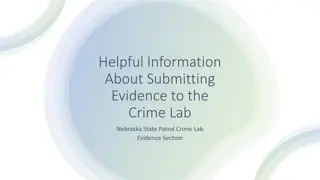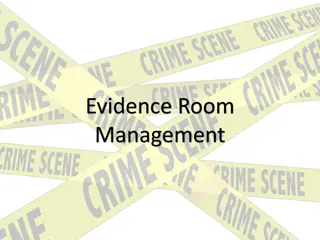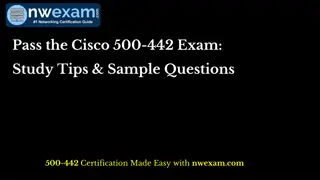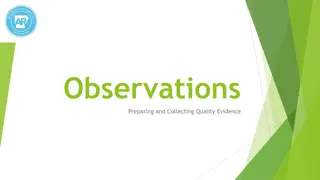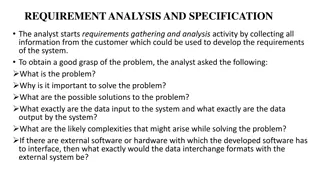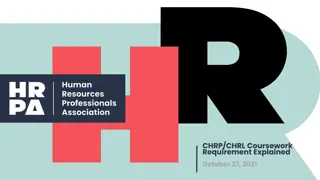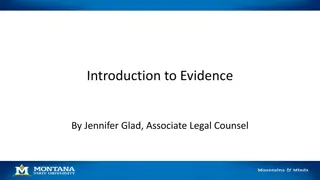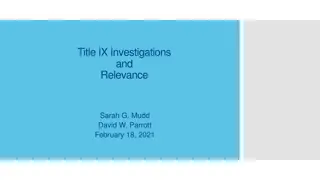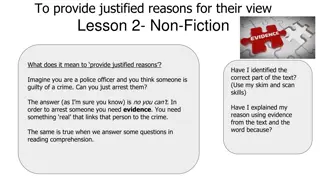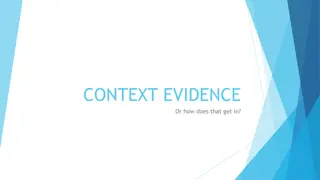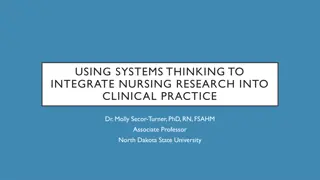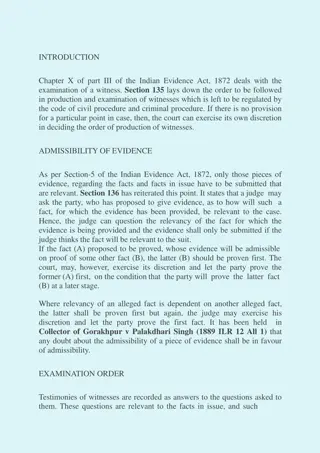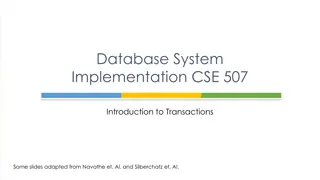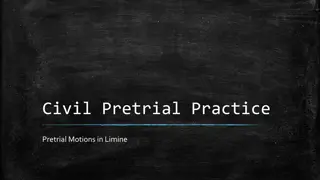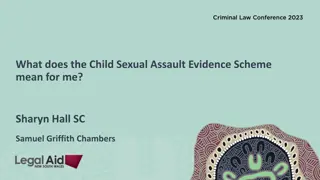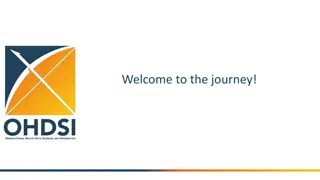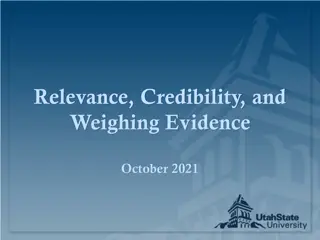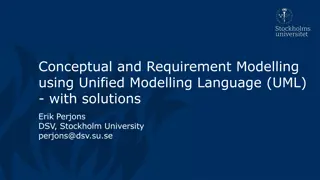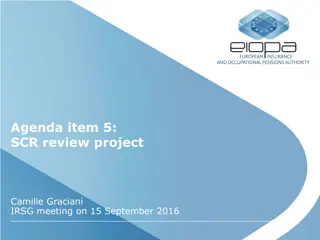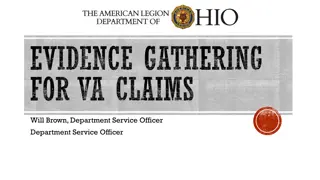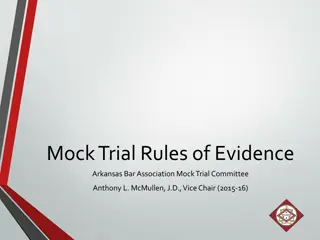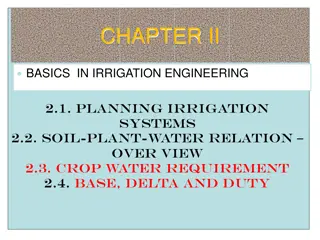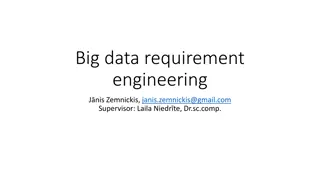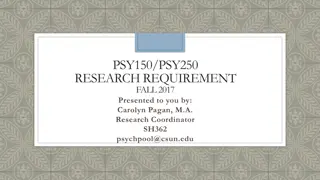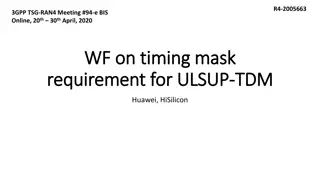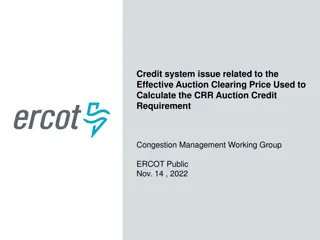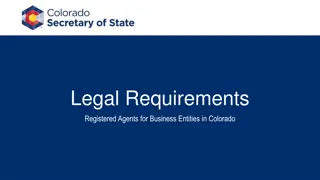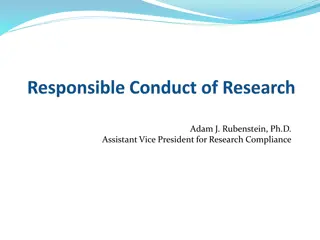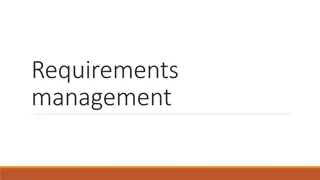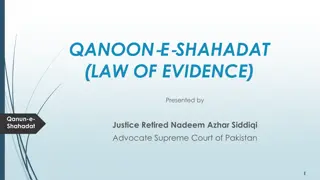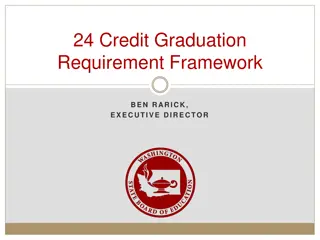The Role of Artifacts and Evidence in Educator Evaluation and Support
Exploring the role of artifacts and evidence in educator evaluation, this content covers the three categories of evidence required by the Oregon Framework. It delves into the efficient process that reduces redundancy, essential components of SLG goals, and the types of evidence relevant to professio
0 views • 15 slides
Understanding Impression Evidence Collection in CSI Investigations
Impression evidence plays a crucial role in investigations, including shoeprints, tool marks, tire tracks, bite marks, and riffling marks on bullets. This evidence can be collected in 2D using photography or tape lifts, and in 3D through casting methods. Differentiating between class and individual
0 views • 21 slides
Helpful Information About Submitting Evidence to the Crime Lab.
Helpful information about submitting evidence to the Nebraska State Patrol Crime Lab's Evidence Section. Learn about the NSP 750 Evidence Submittal Form, submission process, and guidelines for resubmissions. Ensure all necessary details are provided for proper analysis of evidence.
5 views • 16 slides
Illegally obtained evidence
Illegally obtained evidence refers to evidence acquired through unlawful means, such as searches without warrants or extraction under duress. The Fruit of the Poisonous Tree doctrine renders evidence inadmissible if derived from illegally obtained evidence. The Exclusionary Rule prohibits the use of
2 views • 30 slides
Evidence Room Management
Explore the intricacies of evidence room management in a law enforcement setting, including the roles of individuals like Greg Van Buskirk, differences in crime scene management between large and small departments, the distinction between property and evidence, the importance of maintaining chain of
0 views • 8 slides
Pass the Cisco 500-442 Exam: Study Tips & Sample Questions
Begin your journey here at \/\/bit.ly\/3QZlFIZ to gain comprehensive insights into the 500-442 exam guide, essential for cracking the Unified Contact Center Enterprise Specialization requirement for Systems Engineers. Access detailed information about 500-442 tutorials, practice tests, recommended b
2 views • 17 slides
Enhancing Evidence Collection in Education
Explore the importance of minimizing bias in evidence collection, review different types of evidence, identify strategies to collect quality evidence effectively, understand common biases affecting assessment, and learn to spot and address biased statements. Practice eliminating biased language and
0 views • 11 slides
Software Requirement Analysis and Documentation Process
The requirement analysis and specification process involves gathering information from customers, identifying the problem, solutions, data requirements, complexities, and potential interfaces. Key components of a Software Requirements Specification (SRS) document include functional requirements, non
0 views • 23 slides
HRPA Fall 2021 Webinar Series: CHRP/CHRL Coursework Explained
Explore the CHRP/CHRL Coursework Requirement explained in the HRPA Fall 2021 Webinar Series. Gain insights on meeting the Coursework Requirement, Certification Framework, and more to achieve Certified Human Resources Executive (CHRE) Designation. Discover the importance of certification in promoting
0 views • 23 slides
Understanding Evidence in Investigations
Learn about the principles and types of evidence in investigations, including inculpatory and exculpatory evidence, physical, documentary, demonstrative, and verbal evidence. Explore sources of evidence and the significance of collecting relevant information to ensure a fair investigative process.
0 views • 14 slides
Understanding Title IX Investigations and the Role of Evidence Collection
The purpose of a Title IX investigation is to collect relevant evidence, both inculpatory and exculpatory, to allow for impartial decision-making regarding reported sexual harassment cases. Parties involved must receive sufficient notice and have opportunities to participate, present statements, and
1 views • 32 slides
Providing Justified Reasons in Reading Comprehension
Providing justified reasons in reading comprehension involves using evidence from the text to support one's answer, similar to presenting evidence in a legal case. Just as a police officer needs evidence to make an arrest, readers need textual evidence and the word "because" to support their respons
0 views • 11 slides
Understanding Context Evidence in Legal Proceedings
Context evidence in legal proceedings refers to evidence of acts not charged in the indictment, used to provide a background for understanding specific allegations. This type of evidence is often relied upon by the prosecution to explain events or behaviors that may seem isolated or surprising. It i
1 views • 13 slides
Integrating Nursing Research into Clinical Practice with Systems Thinking
Dr. Molly Secor-Turner emphasizes the importance of evidence-based practice (EBP) in nursing. EBP, derived from rigorous research, leads to quality patient outcomes by aligning services with current knowledge. The process involves identifying problems, critiquing evidence, implementing recommendatio
0 views • 21 slides
Examination of Witnesses under Indian Evidence Act, 1872
Chapter X of Part III of the Indian Evidence Act, 1872, outlines the process of examining witnesses, including the order of production and admissibility of evidence. Sections 135 to 141 delve into the rules governing the examination-in-chief, cross-examination, and re-examination of witnesses, empha
2 views • 8 slides
Understanding Properties of Database Transactions
Database transactions play a crucial role in ensuring data integrity and consistency within a database system. This content explores the fundamental properties of transactions, such as atomicity, durability, consistency, and isolation. It delves into the requirements and implications of each propert
2 views • 44 slides
Understanding Pretrial Motions in Limine in Civil Pretrial Practice
Pretrial motions in limine (MIL) play a crucial role in civil pretrial practice by seeking evidentiary rulings in advance to control the introduction of evidence at trial. These motions aim to prevent the admission of irrelevant, inadmissible, or prejudicial evidence and can also facilitate the intr
2 views • 17 slides
Understanding the Child Sexual Assault Evidence Scheme
The Child Sexual Assault Evidence Scheme is a significant initiative that facilitates child sexual assault trials by introducing witness intermediaries and pre-recording of children's evidence. It applies to prescribed sexual offences and mandates specific provisions for hearings and evidence presen
1 views • 16 slides
Empowering Health Decisions and Care through OHDSI Community Collaboration
OHDSI's mission revolves around improving health by empowering a community to generate evidence that enhances health decisions and care. The journey to real-world evidence involves leveraging patient-level data in source systems and establishing reliable evidence. The OHDSI community is dedicated to
0 views • 5 slides
Understanding Evidence-Based Medicine and Clinical Decision-Making
European Patients Academy on Therapeutic Innovation emphasizes the importance of Evidence-Based Medicine (EBM) in providing optimum clinical care. EBM involves systematic review and utilization of clinical research for informed decision-making, benefiting patients in disease management and treatment
7 views • 20 slides
Understanding Relevance, Credibility, and Weighing Evidence in Decision-Making
Explore the importance of relevance and credibility in evidence assessment, the role of hearing panels in evaluating evidence fairly, and the responsibilities they hold. Learn about presenting relevant evidence, policy analysis, and identifying irrelevant evidence to ensure a thorough review process
6 views • 32 slides
Understanding Conceptual and Requirement Modelling Using UML
Enterprise and system models play a crucial role in the business world. This collection of images showcases various aspects of conceptual and requirement modelling using Unified Modelling Language (UML). From business process models to human interactions with software systems, these visual represent
1 views • 92 slides
Mastering Claims, Evidence, and Warrants for Persuasive Writing
Understanding the concepts of claims, evidence, and warrants is crucial for constructing persuasive arguments. Claims represent positions to persuade, evidence supports claims with facts, and warrants bridge the gap between evidence and claims. An exercise is outlined to help practice forming claims
0 views • 8 slides
Review Project on Solvency Capital Requirement Standard Formula
The agenda item discusses the review project led by Camille Graciani at the IRSG meeting in September 2016. The project aims to enhance the Solvency Capital Requirement standard formula by reducing complexity, correcting technical inconsistencies, and addressing market risks. Key objectives include
1 views • 5 slides
Understanding Biased Assimilation and Attitude Polarization in Social Disputes
People with strong opinions on complex social issues tend to interpret evidence in a biased manner, accepting confirming evidence readily while subjecting disconfirming evidence to critical evaluation. This can lead to increased polarization rather than narrowing of disagreement when exposed to the
0 views • 20 slides
Transformation of Quality Assessment Framework in Healthcare
The healthcare quality assessment framework is evolving with a new strategy focused on data-led, people's experiences, care integration, and safety culture. The current framework is transitioning towards a new approach by late 2023, incorporating separate registration and monitoring processes, five
0 views • 14 slides
Understanding Evidence Gathering for VA Claims with The American Legion Department of Ohio
Evidence is crucial for VA claims, and it can come in various forms such as documents, written statements, photos, and video recordings. The framework for evaluating evidence includes factors like relevance, competence, credibility, and weight. Understanding the types of evidence, forms of relevance
0 views • 14 slides
Understanding Mock Trial Rules of Evidence
Mock Trial Rules of Evidence are crucial for determining the admissibility of testimony and evidence in a trial setting. Students preparing for cases need to assess evidence admissibility, make timely objections, and be prepared to defend testimony. The rules cover objections, specific objections ty
0 views • 36 slides
Basics of Crop Water Requirements in Irrigation Engineering
Understanding crop water requirements is crucial in planning effective irrigation systems. Crop water requirements are determined by factors such as evapotranspiration, soil conditions, and achieving maximum production potential. Effective rainfall, soil moisture storage, and groundwater contributio
0 views • 83 slides
Agreements on Core Requirement Maintenance of Direct SCell Activation
Companies provided contributions on core requirement maintenance to RAN4#99-e, focusing on timelines, known conditions, and measurement thresholds for Direct SCell Activation in NR.FRI. This document outlines unresolved issues and agreements reached regarding activation procedures, condition require
0 views • 6 slides
Unleashing the Potential of Big Data in Requirement Engineering
Explore the transformative power of big data in requirement engineering, uncovering its impact on industries and society. Discover the challenges faced in utilizing data effectively and the solutions to bridge the gap between analytics and business objectives.
0 views • 19 slides
Practice and Procedure in Judicial Review: Factual Evidence and Interveners
The content provides valuable insights into the practice and procedure regarding factual evidence and interveners in judicial review cases. It covers general rules, recent cases, applications for oral evidence, questioning witnesses, opinion evidence, and the role of interveners. Key points include
0 views • 28 slides
PSY150/PSY250 Research Requirement Fall 2017 Overview
The PSY150/PSY250 Research Requirement for Fall 2017 provides students with practical experience in psychological research. Over 2,000 students participated in nearly 200 experiments conducted by faculty, graduate students, and upper-level psychology students. Students must complete the research req
0 views • 9 slides
Discussion on Timing Mask Requirement for ULSUP-TDM in RAN4#94e Meeting
In the RAN4#94e and #94e-Bis meetings, discussions were held on the timing mask requirement for ULSUP-TDM, particularly focusing on sub-topics like evaluating uplink timing differences between LTE and NR, clarifying present time mask conditions, and testing time mask requirements. The key issue cent
0 views • 4 slides
Auction Credit Requirement Issue Impact on ERCOT's CRR Auctions
A software error in the Credit Monitoring and Management system led to incorrect determination of the Effective Auction Clearing Price impacting the Auction Credit Requirement for Congestion Revenue Rights in ERCOT's CRR auctions. The error occurred due to automation in September 2021 and was resolv
0 views • 5 slides
Registered Agents Requirement for Business Entities in Colorado
Colorado law requires every domestic and foreign business entity operating in the state to maintain a registered agent. This agent can be an individual, a domestic entity, or a foreign entity with a place of business in Colorado. The registered agent is authorized to receive legal documents and noti
0 views • 9 slides
Responsible Conduct of Research (RCR) Training Requirements and Compliance
The Responsible Conduct of Research (RCR) training is essential for graduate students to ensure compliance with institutional policies. Completing the Collaborative Institutional Training Initiative (CITI) basic course is a graduation requirement, emphasizing values like honesty, accuracy, objectivi
0 views • 13 slides
Importance of Requirements Management in Project Success
Requirements management is crucial for project success, involving careful consideration of various requirement types such as functional, performance, constraints, and more. Clear, consistent, and verifiable requirements are essential, along with understanding the origins, impacts, and alternatives f
0 views • 13 slides
Understanding Qanun-e-Shahadat: Law of Evidence in Pakistan
Qanun-e-Shahadat Order 1984 replaced the Evidence Act of 1872 in Pakistan, aiming to align the law of evidence with Islamic principles. This law is crucial for judicial proceedings, governing the admissibility of oral and documentary evidence, primary and secondary evidence, and resolving conflicts
0 views • 22 slides
Washington State Board of Education 24 Credit Graduation Requirement Framework
Graduation requirement guiding principles aim to ensure all students receive foundational high school credits, including STEM courses. Postsecondary pathways offer options like CTE programs and pursuing degrees. Stakeholder input suggests creating personalized pathway requirements and expanding the
0 views • 7 slides


